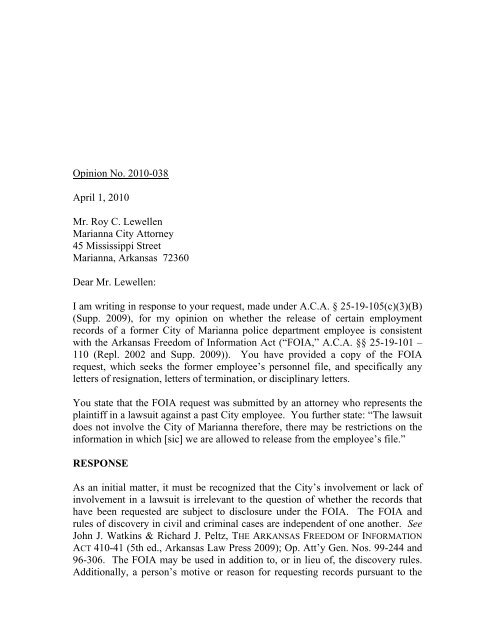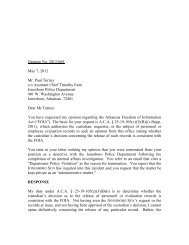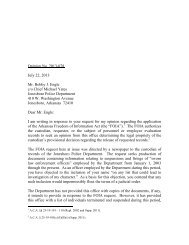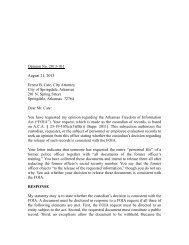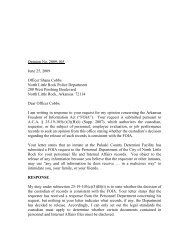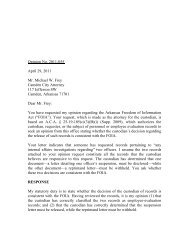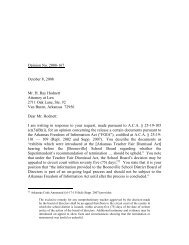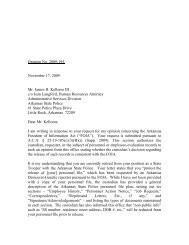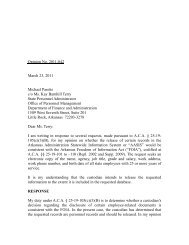Opinion No. 2010-038 April 1, 2010 Mr. Roy C. Lewellen Marianna ...
Opinion No. 2010-038 April 1, 2010 Mr. Roy C. Lewellen Marianna ...
Opinion No. 2010-038 April 1, 2010 Mr. Roy C. Lewellen Marianna ...
You also want an ePaper? Increase the reach of your titles
YUMPU automatically turns print PDFs into web optimized ePapers that Google loves.
<strong>Opinion</strong> <strong>No</strong>. <strong>2010</strong>-<strong>038</strong><br />
<strong>April</strong> 1, <strong>2010</strong><br />
<strong>Mr</strong>. <strong>Roy</strong> C. <strong>Lewellen</strong><br />
<strong>Marianna</strong> City Attorney<br />
45 Mississippi Street<br />
<strong>Marianna</strong>, Arkansas 72360<br />
Dear <strong>Mr</strong>. <strong>Lewellen</strong>:<br />
I am writing in response to your request, made under A.C.A. § 25-19-105(c)(3)(B)<br />
(Supp. 2009), for my opinion on whether the release of certain employment<br />
records of a former City of <strong>Marianna</strong> police department employee is consistent<br />
with the Arkansas Freedom of Information Act (“FOIA,” A.C.A. §§ 25-19-101 –<br />
110 (Repl. 2002 and Supp. 2009)). You have provided a copy of the FOIA<br />
request, which seeks the former employee’s personnel file, and specifically any<br />
letters of resignation, letters of termination, or disciplinary letters.<br />
You state that the FOIA request was submitted by an attorney who represents the<br />
plaintiff in a lawsuit against a past City employee. You further state: “The lawsuit<br />
does not involve the City of <strong>Marianna</strong> therefore, there may be restrictions on the<br />
information in which [sic] we are allowed to release from the employee’s file.”<br />
RESPONSE<br />
As an initial matter, it must be recognized that the City’s involvement or lack of<br />
involvement in a lawsuit is irrelevant to the question of whether the records that<br />
have been requested are subject to disclosure under the FOIA. The FOIA and<br />
rules of discovery in civil and criminal cases are independent of one another. See<br />
John J. Watkins & Richard J. Peltz, THE ARKANSAS FREEDOM OF INFORMATION<br />
ACT 410-41 (5th ed., Arkansas Law Press 2009); Op. Att’y Gen. <strong>No</strong>s. 99-244 and<br />
96-306. The FOIA may be used in addition to, or in lieu of, the discovery rules.<br />
Additionally, a person’s motive or reason for requesting records pursuant to the
<strong>Mr</strong>. <strong>Roy</strong> C. <strong>Lewellen</strong><br />
<strong>Marianna</strong> City Attorney<br />
<strong>Opinion</strong> <strong>No</strong>. <strong>2010</strong>-<strong>038</strong><br />
Page 2<br />
FOIA is irrelevant. Op. Att’y Gen. 92-289 and Watkins & Peltz, supra at 410. If<br />
the record is a “public record” under the FOIA and is subject to no exception, it<br />
must be released to members of the public without regard to their motive for<br />
seeking access.<br />
Turning then to the FOIA request at hand, my duty under subsection 25-19-<br />
105(c)(3)(B)(i) is to state whether the decision of the custodian of records is<br />
consistent with the FOIA. You have not indicated what the custodian’s decision<br />
was with respect to the requested documents, or indeed whether the custodian has<br />
made a decision. Because my duty under subsection 25-19-105(c)(3)(B)(i) extends<br />
only to a review of the records-custodian’s decision, I cannot specifically address<br />
your request or any specific documents. My duty in this regard arises after the<br />
records have been located or identified in response to the FOIA request. I am not<br />
authorized or required to advise the custodian regarding the initial selection of<br />
responsive documents. E.g., Op. Att’y Gen. 2006-158.<br />
<strong>No</strong>t having seen the actual records in question, I cannot definitively opine on the<br />
release of specific records. If some or all the documents constitute “personnel<br />
records,” however, they are open to public inspection unless their release<br />
constitutes a clearly unwarranted invasion of personal privacy. E.g., Op. Att’y<br />
Gen. 2008-004. If, however, some or all of the documents constitute “employee<br />
evaluation or job performance records,” the test for release of the records involves<br />
three elements: finality, relevance, and a “compelling public interest” in<br />
disclosure. A.C.A. 25-19-105(c)(1) (Supp. 2009). Both tests are discussed further<br />
below. Assuming that some or all the documents can be classified as either<br />
personnel records or employee evaluation or job performance records, the<br />
custodian would need to assess all the surrounding facts to determine whether the<br />
applicable tests are met.<br />
DISCUSSION<br />
A document must be disclosed in response to a FOIA request if all three of the<br />
following elements are met. First, the FOIA request must be directed to an entity<br />
subject to the act. Second, the requested document must constitute a public<br />
record. Third, no exceptions allow the document to be withheld.
<strong>Mr</strong>. <strong>Roy</strong> C. <strong>Lewellen</strong><br />
<strong>Marianna</strong> City Attorney<br />
<strong>Opinion</strong> <strong>No</strong>. <strong>2010</strong>-<strong>038</strong><br />
Page 3<br />
The first two elements appear met in this case. As for the first element, it appears<br />
that the documents are held by the Police Department of the City of <strong>Marianna</strong>,<br />
which is a public entity. As for the second element, the FOIA defines “public<br />
records” as:<br />
writings, recorded sounds, films, tapes, electronic or computer-based<br />
information, or data compilations in any medium, required by law to<br />
be kept or otherwise kept, and which constitute a record of the<br />
performance or lack of performance of official functions which are<br />
or should be carried out by a public official or employee, a<br />
governmental agency, or any other agency wholly or partially<br />
supported by public funds or expending public funds. All records<br />
maintained in public offices or by public employees within the scope<br />
of their employment shall be presumed to be public records.<br />
A.C.A. § 25-19-103(5)(A) (Supp. 2009). Because the records are held by a public<br />
entity, they are rebuttably presumed to be public records. <strong>No</strong>t having seen any of<br />
the records in question, I cannot assess whether the presumption is actually<br />
rebutted in this instance. If the presumption is rebutted, then the document fails<br />
this element and the document must not be released. If the presumption cannot be<br />
rebutted, then the FOIA analysis proceeds to the third element: whether any<br />
exceptions preclude disclosure. There are two relevant exceptions and a general<br />
overriding constitutional concern of which the custodian must be aware.<br />
The FOIA provides two exemptions for items normally found in employees’ files. 1<br />
For purposes of the FOIA, items in employees’ files can usually be divided into<br />
two mutually exclusive groups: “personnel records” under section 25-19-<br />
1 This office and the leading commentators on the FOIA have observed that personnel files<br />
usually include: employment applications; school transcripts; payroll-related documents such as<br />
information about reclassifications, promotions, or demotions; transfer records; health and life<br />
insurance forms; performance evaluations; recommendation letters; disciplinary-action records;<br />
requests for leave-without-pay; certificates of advanced training or education; and legal<br />
documents such as subpoenas. E.g., Op. Att’y Gen. 97-368; John J. Watkins & Richard J. Peltz,<br />
THE ARKANSAS FREEDOM OF INFORMATION ACT 181–82 (4th ed., m & m Press 2004).
<strong>Mr</strong>. <strong>Roy</strong> C. <strong>Lewellen</strong><br />
<strong>Marianna</strong> City Attorney<br />
<strong>Opinion</strong> <strong>No</strong>. <strong>2010</strong>-<strong>038</strong><br />
Page 4<br />
105(b)(12); 2 or “employee evaluation or job performance records” under section<br />
25-19-105(c)(1). 3 The test for whether these two types of documents may be<br />
released differs significantly.<br />
If a document is a “personnel record,” the document is open to public inspection<br />
and copying except “to the extent that disclosure would constitute a clearly<br />
unwarranted invasion of personal privacy.” A.C.A. § 25-19-105(b)(12) (Supp.<br />
2009). The FOIA does not define the term “personnel records.” Whether a<br />
particular record constitutes a “personnel record,” within the meaning of the FOIA<br />
is, of course, a question of fact that can only be definitively determined by<br />
reviewing the record itself. However, the Attorney General has consistently taken<br />
the position that “personnel records” are all records other than employee<br />
evaluation and job performance records that pertain to individual employees,<br />
former employees, or job applicants. See, e.g., Op. Att’y Gen. <strong>No</strong>. 1999-147,<br />
citing Watkins, THE ARKANSAS FREEDOM OF INFORMATION ACT, p.134 (m&m<br />
Press, 3d ed., 1998).<br />
The FOIA likewise does not define the phrase “clearly unwarranted invasion of<br />
personal privacy.” However, the Arkansas Supreme Court has construed the<br />
phrase. To determine whether the release of a personnel record would constitute a<br />
“clearly unwarranted invasion of personal privacy,” the court applies a balancing<br />
test. The test weighs the public’s interest in accessing the records against the<br />
individual’s interest in keeping the records private. See Young v. Rice, 308 Ark.<br />
593, 826 S.W.2d 252 (1992). The balancing takes place with a thumb on the scale<br />
favoring disclosure. To aid in conducting the balancing test, the court in Young<br />
elucidated a two-step approach. First, the custodian must assess whether the<br />
information contained in the requested document is of a personal or intimate<br />
2 This subsection states: “It is the specific intent of this section that the following shall not be<br />
deemed to be made open to the public under the provisions of this chapter … (12) [p]ersonnel<br />
records to the extent that disclosure would constitute a clearly unwarranted invasion of personal<br />
privacy.”<br />
3<br />
This subsection states: “<strong>No</strong>twithstanding subdivision (b)(12) of this section, all employee<br />
evaluation or job performance records, including preliminary notes and other materials, shall be<br />
open to public inspection only upon final administrative resolution of any suspension or<br />
termination proceeding at which the records form a basis for the decision to suspend or terminate<br />
the employee and if there is a compelling public interest in their disclosure.”
<strong>Mr</strong>. <strong>Roy</strong> C. <strong>Lewellen</strong><br />
<strong>Marianna</strong> City Attorney<br />
<strong>Opinion</strong> <strong>No</strong>. <strong>2010</strong>-<strong>038</strong><br />
Page 5<br />
nature such that it gives rise to greater than de minimus privacy interest. Id. at 598,<br />
826 S.W.2d at 255. If the privacy interest is merely de minimus, then the thumb on<br />
the scale favoring disclosure outweighs the privacy interest. Second, if the<br />
information does give rise to a greater than de minimus privacy interest, then the<br />
custodian must determine whether that interest is outweighed by the public’s<br />
interest in disclosure. Id., 826 S.W.2d at 255. Because the exceptions must be<br />
narrowly construed, the person resisting disclosure bears the burden of showing<br />
that, under the circumstances, his privacy interests outweigh the public’s interests.<br />
Stilley, supra, at 313. The fact that the subject of any such records may consider<br />
release of the records an unwarranted invasion of personal privacy is irrelevant to<br />
the analysis because the test is objective. E.g., Op. Att’y Gen. <strong>No</strong>s. 2001-112,<br />
2001-022, 94-198.<br />
The question of whether the release of any particular personnel record would<br />
constitute a clearly unwarranted invasion of personal privacy is always a question<br />
of fact. Op. Att’y Gen. <strong>No</strong>s. 2006-176, 2004-260, 2003-336, 2003-201, 98-001. A<br />
number of documents contained in personnel files are typically releasable under<br />
this standard, with appropriate redactions. I believe a current employee’s job<br />
application, employment history, and any background investigation that served as<br />
a basis for his hiring constitute “personnel records” under the standard set forth<br />
above. As my predecessor noted in Op. Att’y Gen. 2007-278:<br />
Certain … employment-related records found in police personnel<br />
files are typically subject to release with any appropriate redactions.<br />
See, e.g., Op. Att’y Gen. <strong>No</strong>s. 2005-268 (mentioning job application<br />
documents, resumes, documents evidencing completion of<br />
psychological examination; and personal history statements as being<br />
subject to release with appropriate redactions); and 2004-178<br />
(discussing training files with scores redacted).<br />
In contrast, some information typically found in an employee’s personnel file are<br />
not subject to release under the FOIA. Some of those items include: dates of birth<br />
of public employees (Op. 2007-064); social security numbers (Ops. 2006-035,<br />
2003-153); medical information (Op. 2003-153); any information identifying<br />
certain law enforcement officers currently working undercover (A.C.A. § 25-19-<br />
105(b)(10)); driver’s license numbers (Op. 2007-025); insurance coverage (Op.<br />
2004-167); tax information or withholding (Ops. 2005-194, 2003-385); payroll
<strong>Mr</strong>. <strong>Roy</strong> C. <strong>Lewellen</strong><br />
<strong>Marianna</strong> City Attorney<br />
<strong>Opinion</strong> <strong>No</strong>. <strong>2010</strong>-<strong>038</strong><br />
Page 6<br />
deductions (Op. 98-126); banking information (Op. 2005-195); unlisted telephone<br />
numbers (Op. 2005-114); personal e-mail addresses (Op. 2004-225); and marital<br />
status of employees and information about dependents (Op. 2001-080).<br />
<strong>No</strong>t having seen any records at issue, I cannot assess which records (if any) met<br />
the personnel-records definition. Consequently, I cannot assess whether the test<br />
for the release of personnel records is met.<br />
The second potentially relevant exception is for “employee evaluation or job<br />
performance records,” which the FOIA likewise does not define. But this office<br />
has consistently opined that the phrase refers to records that were created by (or at<br />
the behest of) the employer, and that detail the employee’s performance or lack of<br />
performance on the job. Op. Att’y Gen. 2004-012 (and opinions cited therein).<br />
This exception includes records generated while investigating allegations of<br />
employee misconduct that detail incidents that gave rise to an allegation of<br />
misconduct. Id.<br />
If a document meets the above definition, the document cannot be released unless<br />
the following elements have been met:<br />
1. There has been a final administrative resolution of any suspension<br />
or termination proceeding (finality);<br />
2. The records in question formed a basis for the decision made in<br />
that proceeding to suspend or terminate the employee<br />
(relevance); and<br />
3. There is a compelling public interest in the disclosure of the<br />
records in question (compelling interest).<br />
A.C.A. § 25-19-105(c)(1) (Supp. 2009). All three of the conditions must be<br />
present before an evaluation or job performance record may be released. Op.<br />
Att’y Gen. 2008-065. <strong>No</strong>t having seen any of the documents in question, I cannot<br />
assess whether the records (if any) meet the definition of employee evaluation<br />
records. Consequently, I cannot assess whether the documents formed the basis<br />
(i.e., the relevance prong) of a final administrative proceeding for suspension or<br />
termination (i.e., the finality prong).
<strong>Mr</strong>. <strong>Roy</strong> C. <strong>Lewellen</strong><br />
<strong>Marianna</strong> City Attorney<br />
<strong>Opinion</strong> <strong>No</strong>. <strong>2010</strong>-<strong>038</strong><br />
Page 7<br />
As for the third prong, the FOIA never defines the key phrase “compelling public<br />
interest.” But two leading commentators on the FOIA, referring to this office’s<br />
opinions on this issue, have offered the following guidelines:<br />
[I]t seems that the following factors should be considered in<br />
determining whether a compelling public interest is present: (1) the<br />
nature of the infraction that led to suspension or termination, with<br />
particular concern as to whether violations of the public trust or<br />
gross incompetence are involved; (2) the existence of a public<br />
controversy related to the agency and its employees; and (3) the<br />
employee’s position within the agency. In short, a general interest in<br />
the performance of public employees should not be considered<br />
compelling, for that concern is, at least theoretically, always present.<br />
However, a link between a given public controversy, an agency<br />
associated with the controversy in a specific way, and an employee<br />
within the agency who commits a serious breach of public trust<br />
should be sufficient to satisfy the “compelling public interest”<br />
requirement.<br />
Watkins & Peltz, supra, at 207 (footnotes omitted). Professors Watkins and Peltz<br />
also note that “the status of the employee” or “his rank within the bureaucratic<br />
hierarchy” may be relevant in determining whether a “compelling public interest”<br />
exists. Id. at 206 (noting that “[a]s a practical matter, such an interest is more<br />
likely to be present when a high-level employee is involved than when the<br />
[records] of ‘rank-and-file’ workers are at issue.”) With respect to allegations of<br />
police misconduct, I noted as follows in Op. Att’y Gen. 2007-206:<br />
a compelling public interest likely exists in information reflecting a<br />
violation of departmental rules by a “cop on the beat” in his<br />
interactions with the public. See Op. Att’y Gen. 2006-106. If the<br />
prior disciplinary records reflect a suspension based on this type of<br />
infraction, a strong case for the finding of a compelling public<br />
interest exists.
<strong>Mr</strong>. <strong>Roy</strong> C. <strong>Lewellen</strong><br />
<strong>Marianna</strong> City Attorney<br />
<strong>Opinion</strong> <strong>No</strong>. <strong>2010</strong>-<strong>038</strong><br />
Page 8<br />
Whether there is a compelling public interest in particular records is a question of<br />
fact that must be determined in the first instance by the custodian of the records,<br />
considering all of the relevant information.<br />
As reflected by the above test, disciplinary records that were created by (or at the<br />
behest of) the employer and that detail the employee’s performance or lack of<br />
performance on the job are exempt from release in the absence of a suspension or<br />
termination decision. With regard, specifically, to letters of termination, this office<br />
has previously opined that such letters constitute evaluation or job performance<br />
records if they contain the reasons for the suspension or termination. E.g., Op.<br />
Att’y Gen. 2001-276 (and opinions cited therein). If, however, such a letter does<br />
no more than reflect the fact of termination, without elaboration, in my opinion it<br />
is properly classified as a “personnel record” under A.C.A. § 25-19-105(b)(12) and<br />
is subject to release under the separate test discussed above for release of that<br />
category of records. E.g., Op. Att’y Gen. 2006-147. Similarly, with regard to<br />
letters of resignation, such letters are generally properly classified as “personnel<br />
records.” Op. Att’y Gen. 2006-082. But see Op. Att’y Gen. 2009-156 (noting that<br />
a letter of resignation would be considered an employee evaluation record if the<br />
letter sets forth the reasons for an employee's suspension or termination, and citing<br />
Op. Att’y Gen. <strong>No</strong>s. 2007-61 and 2006-147.<br />
Apart from the legal tests for personnel records and employee evaluation records,<br />
the custodian should be aware of some general constitutional implications of<br />
disclosure. Any party who may be identified from any of the requested records<br />
may have a constitutionally-protected privacy interest in those records. The<br />
Arkansas Supreme Court has recognized that the constitutional right of privacy<br />
can supersede the specific disclosure requirements of the FOIA, at least with<br />
regard to the release of documents containing constitutionally-protectable<br />
information. McCambridge v. City of Little Rock, 298 Ark. 219, 766 S.W.2d 909<br />
(1989). The McCambridge court held that a constitutional privacy-interest applies<br />
to matters that: (1) an individual wants to and has kept confidential; (2) can be<br />
kept confidential but for the challenged governmental action in disclosing the<br />
information; and (3) would be harmful or embarrassing to a reasonable person if<br />
disclosed.<br />
Whether certain information is constitutionally protected under the right to<br />
privacy, is a highly factual decision the custodian of records must initially make.
<strong>Mr</strong>. <strong>Roy</strong> C. <strong>Lewellen</strong><br />
<strong>Marianna</strong> City Attorney<br />
<strong>Opinion</strong> <strong>No</strong>. <strong>2010</strong>-<strong>038</strong><br />
Page 9<br />
If the custodian determines that the records contain constitutionally-protectable<br />
information (i.e., information that meets the McCambridge test), then the<br />
custodian must consider whether the governmental interest in disclosure (i.e., the<br />
public’s legitimate interest in the matter) outweighs the privacy interest in<br />
withholding them. As always, the person claiming the right will have the burden<br />
of establishing it.<br />
Deputy Attorney General Elisabeth A. Walker prepared the foregoing opinion,<br />
which I hereby approve.<br />
Sincerely,<br />
DUSTIN McDANIEL<br />
Attorney General<br />
DM:EAW/cyh


